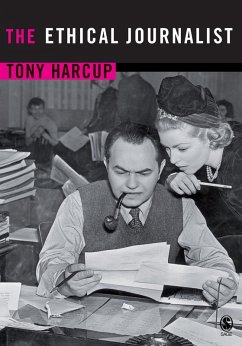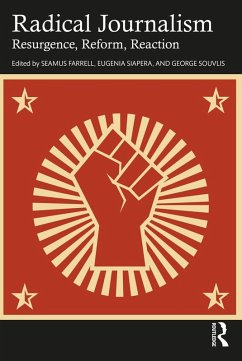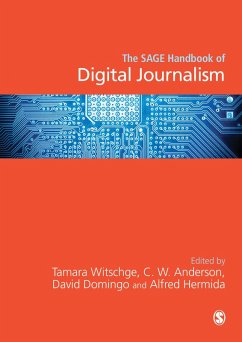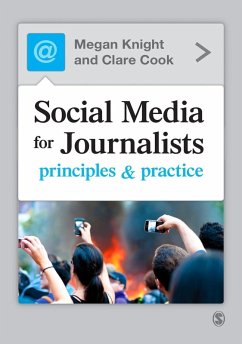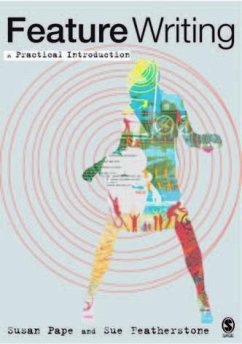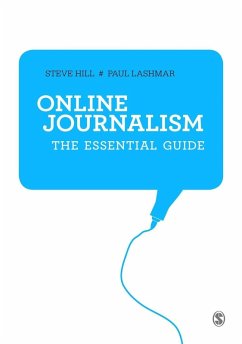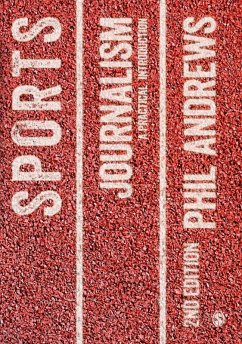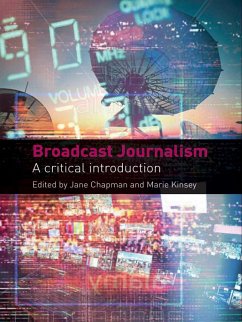
Journalism and Society (eBook, PDF)
Versandkostenfrei!
Sofort per Download lieferbar
37,95 €
inkl. MwSt.
Weitere Ausgaben:

PAYBACK Punkte
19 °P sammeln!
Every serious student of journalism should read this book... Denis McQuail has succeeded in producing a work of scholarship that shows what journalists do and what they should do. - Stephen Coleman, University of Leeds "For a half century we have spoken earnestly of journalism's responsibility to society instead of to business and government. Now this concept is given sophistication unmatched, by the best scholar of media theory of his generation." - Clifford Christians, University of Illinois "The grand old man of communication theory presents an overarching social theory of journalism that g...
Every serious student of journalism should read this book... Denis McQuail has succeeded in producing a work of scholarship that shows what journalists do and what they should do.
- Stephen Coleman, University of Leeds
"For a half century we have spoken earnestly of journalism's responsibility to society instead of to business and government. Now this concept is given sophistication unmatched, by the best scholar of media theory of his generation."
- Clifford Christians, University of Illinois
"The grand old man of communication theory presents an overarching social theory of journalism that goes beyond the usual Anglo-American focus."
- Jo Bardoel, University of Amsterdam (ASCoR) and Nijmegen
"This book deals with the eternal question of how journalism is linked to society... I cannot think of a better staple food for students of journalism at all levels."
- Kaarle Nordenstreng, University of Tampere
This is a major new statement on the role of journalism in democracy from one of media and communication's leading thinkers. Denis McQuail leads the reader through a systematic exploration of how and why journalism and society have become so inextricably entwined and - as importantly - what this relationship should be like. It is a strong re-statement of the fundamental values that journalism aspires to. Written for students, this book:
This textbook is the perfect answer to the how and why of journalism. It is crucial reading for any student of media studies, communication studies and journalism.
- Stephen Coleman, University of Leeds
"For a half century we have spoken earnestly of journalism's responsibility to society instead of to business and government. Now this concept is given sophistication unmatched, by the best scholar of media theory of his generation."
- Clifford Christians, University of Illinois
"The grand old man of communication theory presents an overarching social theory of journalism that goes beyond the usual Anglo-American focus."
- Jo Bardoel, University of Amsterdam (ASCoR) and Nijmegen
"This book deals with the eternal question of how journalism is linked to society... I cannot think of a better staple food for students of journalism at all levels."
- Kaarle Nordenstreng, University of Tampere
This is a major new statement on the role of journalism in democracy from one of media and communication's leading thinkers. Denis McQuail leads the reader through a systematic exploration of how and why journalism and society have become so inextricably entwined and - as importantly - what this relationship should be like. It is a strong re-statement of the fundamental values that journalism aspires to. Written for students, this book:
- Makes the theory accessible and relevant
- Teaches the importance of journalism to power and politics
- Explores the status and future of journalism as a profession
- Outlines the impact and consequences of the digital
- Reveals journalism as it is, but also as it should be
- Takes each chapter further with guided reading list and free online journal articles.
This textbook is the perfect answer to the how and why of journalism. It is crucial reading for any student of media studies, communication studies and journalism.
Dieser Download kann aus rechtlichen Gründen nur mit Rechnungsadresse in A, D ausgeliefert werden.




